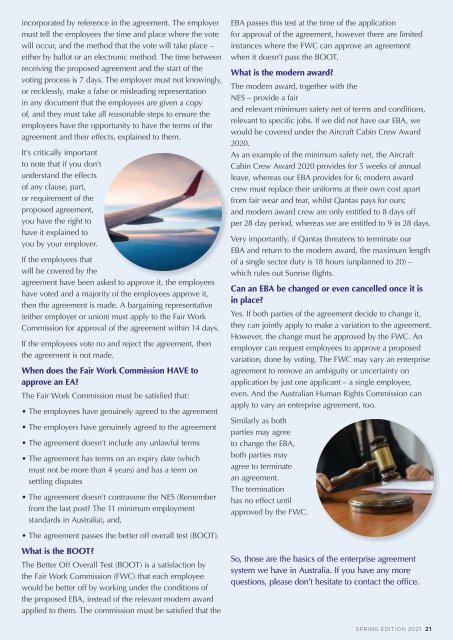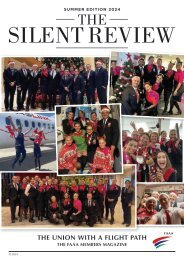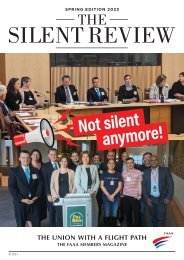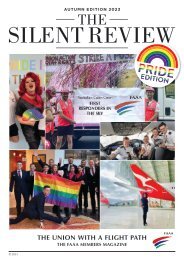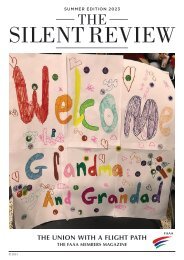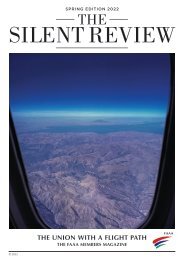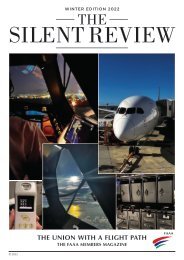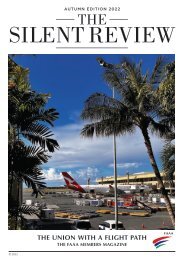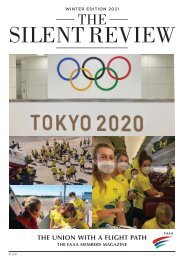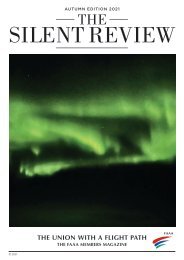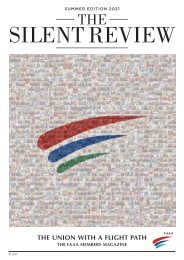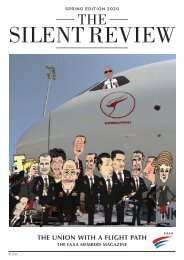THE SILENT REVIEW_SPRING EDITION 2021_WEB
Create successful ePaper yourself
Turn your PDF publications into a flip-book with our unique Google optimized e-Paper software.
incorporated by reference in the agreement. The employer<br />
must tell the employees the time and place where the vote<br />
will occur, and the method that the vote will take place –<br />
either by ballot or an electronic method. The time between<br />
receiving the proposed agreement and the start of the<br />
voting process is 7 days. The employer must not knowingly,<br />
or recklessly, make a false or misleading representation<br />
in any document that the employees are given a copy<br />
of, and they must take all reasonable steps to ensure the<br />
employees have the opportunity to have the terms of the<br />
agreement and their effects, explained to them.<br />
It's critically important<br />
to note that if you don't<br />
understand the effects<br />
of any clause, part,<br />
or requirement of the<br />
proposed agreement,<br />
you have the right to<br />
have it explained to<br />
you by your employer.<br />
If the employees that<br />
will be covered by the<br />
agreement have been asked to approve it, the employees<br />
have voted and a majority of the employees approve it,<br />
then the agreement is made. A bargaining representative<br />
(either employer or union) must apply to the Fair Work<br />
Commission for approval of the agreement within 14 days.<br />
If the employees vote no and reject the agreement, then<br />
the agreement is not made.<br />
When does the Fair Work Commission HAVE to<br />
approve an EA?<br />
The Fair Work Commission must be satisfied that:<br />
• The employees have genuinely agreed to the agreement<br />
• The employers have genuinely agreed to the agreement<br />
• The agreement doesn't include any unlawful terms<br />
• The agreement has terms on an expiry date (which<br />
must not be more than 4 years) and has a term on<br />
settling disputes<br />
• The agreement doesn't contravene the NES (Remember<br />
from the last post? The 11 minimum employment<br />
standards in Australia), and,<br />
EBA passes this test at the time of the application<br />
for approval of the agreement, however there are limited<br />
instances where the FWC can approve an agreement<br />
when it doesn’t pass the BOOT.<br />
What is the modern award?<br />
The modern award, together with the<br />
NES – provide a fair<br />
and relevant minimum safety net of terms and conditions,<br />
relevant to specific jobs. If we did not have our EBA, we<br />
would be covered under the Aircraft Cabin Crew Award<br />
2020.<br />
As an example of the minimum safety net, the Aircraft<br />
Cabin Crew Award 2020 provides for 5 weeks of annual<br />
leave, whereas our EBA provides for 6; modern award<br />
crew must replace their uniforms at their own cost apart<br />
from fair wear and tear, whilst Qantas pays for ours;<br />
and modern award crew are only entitled to 8 days off<br />
per 28 day period, whereas we are entitled to 9 in 28 days.<br />
Very importantly, if Qantas threatens to terminate our<br />
EBA and return to the modern award, the maximum length<br />
of a single sector duty is 18 hours (unplanned to 20) –<br />
which rules out Sunrise flights.<br />
Can an EBA be changed or even cancelled once it is<br />
in place?<br />
Yes. If both parties of the agreement decide to change it,<br />
they can jointly apply to make a variation to the agreement.<br />
However, the change must be approved by the FWC. An<br />
employer can request employees to approve a proposed<br />
variation, done by voting. The FWC may vary an enterprise<br />
agreement to remove an ambiguity or uncertainty on<br />
application by just one applicant – a single employee,<br />
even. And the Australian Human Rights Commission can<br />
apply to vary an enterprise agreement, too.<br />
Similarly as both<br />
parties may agree<br />
to change the EBA,<br />
both parties may<br />
agree to terminate<br />
an agreement.<br />
The termination<br />
has no effect until<br />
approved by the FWC.<br />
• The agreement passes the better off overall test (BOOT).<br />
What is the BOOT?<br />
The Better Off Overall Test (BOOT) is a satisfaction by<br />
the Fair Work Commission (FWC) that each employee<br />
would be better off by working under the conditions of<br />
the proposed EBA, instead of the relevant modern award<br />
applied to them. The commission must be satisfied that the<br />
So, those are the basics of the enterprise agreement<br />
system we have in Australia. If you have any more<br />
questions, please don’t hesitate to contact the office.<br />
<strong>SPRING</strong> <strong>EDITION</strong> <strong>2021</strong> 21


